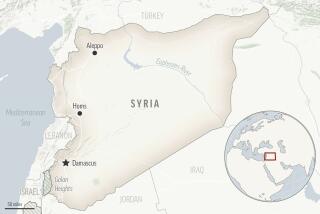‘Lifelong’ Iraqi Spy Official Is in U.S. Hands
- Share via
WASHINGTON — A longtime Iraqi spy official, suspected of involvement in a plot to assassinate former President George H.W. Bush and of having links to Al Qaeda, was delivered to the Iraqi border by Syrian authorities Friday, U.S. officials said.
Farouk Hijazi was taken into custody near the Syrian border, U.S. officials said, indicating new cooperation from a government that had been accused of harboring members of Saddam Hussein’s deposed regime.
Hijazi most recently served as Iraq’s ambassador to Tunisia, and was formerly ambassador to Turkey. But he is of particular interest to the CIA and the Pentagon because he was “a lifelong member of the Iraqi intelligence service,” known as Mukhabarat, a U.S. official said.
“He is significant,” Defense Secretary Donald H. Rumsfeld said. “We think he could be interesting.”
Hijazi is believed to have extensive knowledge of Iraqi operations dating back decades. He occupied the No. 3 position in Hussein’s spy apparatus in the early 1990s when Iraq apparently tried to assassinate former President Bush in Kuwait.
R. James Woolsey, a former CIA director, said that Hijazi’s capture was “the biggest catch so far” for U.S. forces and that Hijazi is a key link between Hussein and terrorist organizations, including Al Qaeda.
“This man was involved, we know, with a number of contacts with Al Qaeda,” Woolsey told CNN.
But current U.S. officials were more measured in their appraisals and expressed some skepticism in particular about persistent reports that Hijazi had once met with Al Qaeda leader Osama bin Laden.
Unconfirmed media reports have indicated that Hijazi served as Hussein’s liaison to anti-Western terrorist organizations and that he met with Bin Laden between 1996 and 1998.
“We’ve seen the reports,” one official said. “We don’t know how true they are. It certainly presents an avenue of questioning.”
He said U.S. intelligence analysts are divided over whether Hijazi would have met Bin Laden given that the terrorist leader had publicly denounced Hussein’s secular regime.
Officials said it is more likely that Hijazi would be able to provide information on the 1993 assassination attempt.
“We think that’s highly probable given the job that he had at the time,” the U.S. official said. “We believe he was either witting or responsible,” and in all likelihood personally involved.
At the time of the assassination attempt, Hijazi was responsible for overseeing foreign covert operations for Hussein.
The FBI’s Washington field office, which handles all investigations of assassination plots involving the chief executive, led the investigation of the 1993 plot. An FBI official said that he knew of no arrest warrant for Hijazi.
Bush had traveled to Kuwait after losing the 1992 presidential election to Bill Clinton. The former president was to be honored by the Kuwaiti government for leading Operation Desert Storm, which expelled Iraqi forces from Kuwait in 1991.
A U.S. official said Iraqi operatives had planned to rig a vehicle with explosives and try to detonate it at an event attended by Bush, or alongside his motorcade.
After the plot was thwarted, President Clinton ordered a U.S. reprisal that included airstrikes on regime targets in Baghdad.
Hijazi did not appear on the mug shot playing cards distributed to U.S. troops in Iraq to help them identify wanted regime figures. He was excluded largely because he was not believed to have been in Iraq when the war started. Instead, he appears to have fled from Tunisia to Syria.
An administration official said Hijazi is believed to have had connections with Egyptian Islamic Jihad, the large Arab organization that was folded into Al Qaeda.
Details on Hijazi’s capture were sketchy Friday, but U.S. officials said he was delivered to the Iraqi border by the Syrian government.
The administration official said the Syrians had held Hijazi for a week and questioned him extensively before turning him over.
“They put him out on the Iraq side of the border,” the administration official said. “The Syrians put him into our hands. We knew when he was going to cross. We knew he was going to be there.”
The official indicated that there was no direct communication between the United States and Syria on the matter but that there were indirect signals, perhaps conveyed through a third party friendly to both sides, such as Jordan.
A Pentagon official confirmed the Syrian cooperation, saying that the expulsion of Hijazi is “certainly an indication that the Syrians are following through on what they said they were going to do.”
Rumsfeld had aimed harsh criticism at Syria during the war, alleging that it had allowed Iraqi leaders to escape and some military supplies, including night-vision goggles, to be delivered to Iraq. Rumsfeld and others in the administration came close to threatening military retaliation at several points.
But more recent signals from the administration indicate that the tensions have lowered. President Bush said this week that Syria had taken some steps to seal its border.
Syria is said to be providing some cooperation with the United States in the broader, U.S.-declared war on terrorism, but the matter is highly sensitive to the Syrian government, which prides itself on loyalty to its neighbors in the Arab world. Citizens of other Arab states are allowed to enter Syria without visas.
Hijazi’s arrest comes on the heels of a flurry of surrenders or captures by U.S. forces of key Iraqi leaders in recent days, including that of Deputy Prime Minister Tarik Aziz on Thursday.
*
Times staff writers Bob Drogin, Josh Meyer and Robin Wright contributed to this report.
More to Read
Sign up for Essential California
The most important California stories and recommendations in your inbox every morning.
You may occasionally receive promotional content from the Los Angeles Times.












